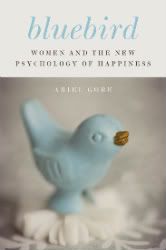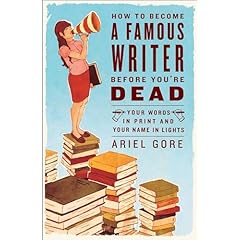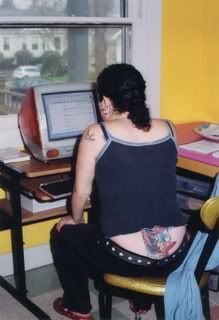I wanted to like The Happiness Project
Has anyone read The Happiness Project by Gretchen Rubin?
Is it just me, or is this book totally barf-worthy?
She talks about "eating healthy" with her friend on the "no fake food" resolution & then they put artificial sweetener on their SALAD (instead of dressing... fewer calories! Yippee!)
This is the nonsense that gives Americans in general & positive psychology in particular a bad name.
GIVE ME OLIVE OIL!
Did we really claw our way to the top of the food chain to eat artificial sweetener on our salad?
I wanted to like The Happiness Project. Really I did.
The premise is right up my alley: A woman--a wife and a mother no less--sets out to make herself happier. And she does so without apology. Radical. Gretchen's character, with all her chart-making anxiety, is endearing. She's well-read and well-educated. Maybe that's why it's all the more maddening to watch her poison her salad and make resolutions like "don't eat hours' d'vours" and "make three new friends" and "unclutter your closets."
Am I really being invited to diet and make fake friends and do housework for happiness?
My daughter doesn't usually go in for feminist conspiracy theories, but she took one look at the book and said, quite seriously, "Maybe she was hired by the government. Just like Taylor Swift. Reverting back to the 50s-housewife kitchen-sink diaries so we won't pay attention to the war and the economy."
I appreciated my daughter's immediate clarity. Here I'd sat with the book for hours, allowing it to make me feel like a loser. I don't consider myself poor, but suddenly I was thinking, Wow, if I can't afford a personal trainer, a professional photographer for the kids, and an organic salad (with saccharine) at a New York deli, how will I ever be happy??
Positive psychologist Martin Seligman has said, "when nations are wealthy and not in civil turmoil and not at war, they start asking what makes like worth living, and that's what positive psychology is about."
But I reject the idea that positive psychology can only be a psychology of privilege.
Rich people have every right to their feelings, sure, but materialism isn't what ultimately makes people happy--materialism is what's killing the planet.
In the introduction to The Happiness Project, Gretchen Rubin makes a point to underline how "fortunate" she is--with her tall, dark, handsome, and well-employed husband and their healthy children. But she also states, as so many writers on happiness do, that she can't really define happiness. "I'll know it when I see it," they say.
Happiness is hard to define--it's a vast human emotion--but if we're going to consider something deeply--if we're going to write a whole book about it--I think we can venture at least a working definition.
Canadian positive psychologist Paul T.P. Wong defines happiness as “the capacity to rejoice in the midst of suffering.” I like that definition. Happiness isn’t the absence of suffering. Happiness doesn’t have to be about privilege or denial.
Clearly happiness is hard to muster when we have real survival anxiety, but if happiness requires a personal trainer and an "over buying" problem as we read about in The Happiness Project--Well, I don't know.
But next time I get $10, I'm spending it on olive oil--& I'm sharing it with someone who'll appreciate a little fat.





10 Comments:
I've been hearing a lot about this book and I am so glad I read your review before I read it! Olive oil all the way baby.
Just finished your book, had happiness project on hold at the library, not reading it now. Your book was so common sense- loved it. Have followed you since hip mama days, glad you are still writing.
I've followed the author's blog for a long time, and mostly enjoyed it (radical diet tips aside). I'm halfway through the book but not enjoying it nearly as much as I thought I would. A lot of the stuff is on the blog already, and it just isn't that interesting to read about how the author tries to bite her tongue from making a nasty comment, or holding a hug for five seconds because research shows that's when the feel-good chemicals start pumping.
Interesting point of view from you and your daughter.
I am glad I am not the only one who thinks Taylor Swift is part of some grand scheme to distract women from doing actual work.
So is Twilight.
I thought I'd like the book more than I did. I've enjoyed the blog quite a bit, but the book put me off. When Gretchen does "Pollyanna Week" and says she loathes toilet humor, she lost me. Also, when I read a review saying she was not only the daughter-in-law of former treasury secretary Robert Rubin but "the fantastically wealthy" Robert Rubin, she really lost me. My Marxist hackles were raised, embarrassing as it is to admit. I guess I learned enough about her life to realize I wouldn't enjoy hanging out with her. I've loved your work Ariel, and can't wait to read Bluebird of Happiness.
I love Paul T.P. Wong's definition you mention: "happiness as 'the capacity to rejoice in the midst of suffering.'"
And, I agree with your thought that happiness should not be a privilege for the wealthy and "blessed."
No matter how much money you have, life happens. No personal trainer or sugar substitute will make pain or suffering go away. Yet, I believe we can still find happiness in connecting with the people around us, in good and bad times.
I look forward to reading your book, and I wish I could be present to hear you read from it and speak about it.
Hey, I really enjoyed the reading last night! You are quite funny.
I read the first few pages, but as someone who isn't rich, and for whom life hasn't been going well, I found it irritating. I appreciate that people from all walks of life and with all kinds of priviledge can become unhappy and feel unfulfilled and I think new challenges, new friends and clean closets are all wonderful things. But I also think books like this can be alienating to those of us who don't have the priviledge of being middle-class and free of mental health issues. Being a Pollyanna is impossible when in the midst of pain. Pain is part of life and I really think that accepting it, feeling it, can make us happier in the long run.
It takes courage to be honest and I have to say that I didn't find the book compelling with regard to how to be happy but I think it says a lot about perfectionism. You can read my review here:
http://www.beruly.com/?p=876
I was very intrigued by the concept of the book, but not its execution. For one thing, it takes a lot of cheek to be a wealthy, white chick and act as though stumbling upon happiness is some kind of breakthrough worthy of a book deal.
I didn't expect any sort of critical examination of privilege or classism, but I felt very much condescended to and a bit sadder after flipping through the first few pages.
Post a Comment
<< Home